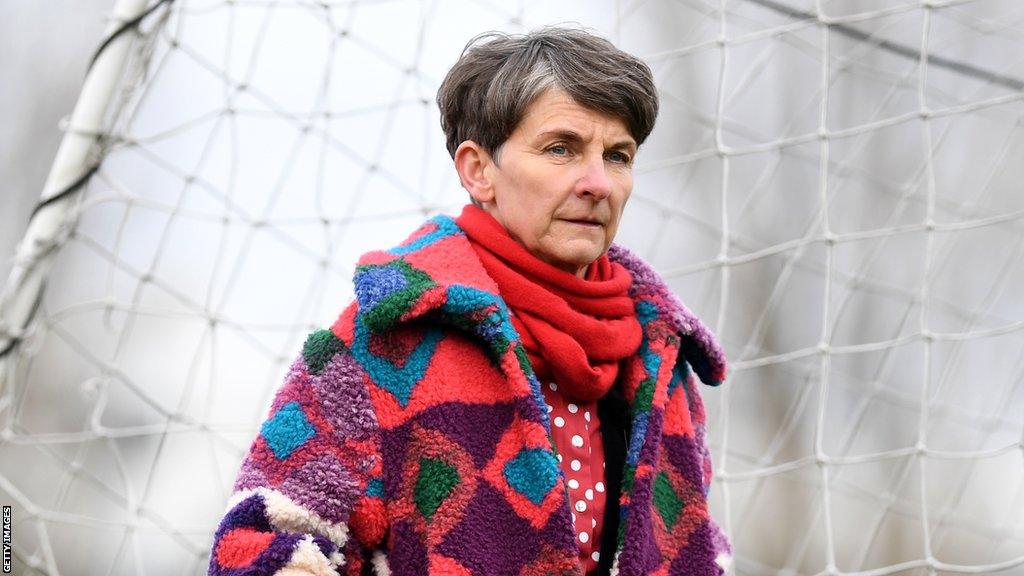Laura McAllister: Uefa Vice-president hopes for lasting Euro 2028 legacy
- Published
Gareth Bale says UK and Republic of Ireland hosting Euro 2028 is a 'proud moment'
Uefa Vice-president Laura McAllister hopes that staging Euro 2028 games will leave a lasting legacy on Welsh football.
Wales will co-host a major football finals for the first time after Uefa confirmed the UK and Ireland as hosts.
McAllister, appointed to Uefa's executive committee in April, was in Nyon for the announcement.
"It's very much a tournament that we hope we'll share the benefits of across the nation," she said.
"It's really pleasing I think that one of the most important and central legacies is around grassroots,"
"Making sure that there's something really substantial left once the Euro 2028 show rollsout of town again.
"Because this can't just be about that period of a couple of months, it's got to be about lasting influence and lasting benefits for all the young boys and girls across Wales."
Football Association of Wales chief executive Noel Mooney says hosting and qualifying for Euro 2028 would benefit the Welsh game by about £10m.
Mooney, who previously worked for Uefa, said money generated from hosting up to six games at Cardiff's Principality Stadium would be invested in Welsh football.
"I'm always a bit reluctant to put a hard cash figure on benefits because benefits are what you can make of them really," McAllister told BBC Radio Wales Sport.
"The most important thing for us in Wales, as Noel said himself, is legacy for the grassroots of the game.
"We know in many respects that the elite end of the game almost takes care of itself, especially when you're successful as a national team, men or women.
"But the grassroots is always the less sexy part of the game and the game that struggles to get sufficient investment.
"The one really pleasing thing about the way which we as five separate nations came together and bid for Euro 2028 was that each of us wanted to put the legacy and the grassroots legacy right at the heart of the bid.
"I think that's so fundamental because we've got so much more work to do in Wales, just as the other countries have, in creating a base for football to grow.
"And that becomes more significant as we grow the girls and women's game because we have very limited capacity around facilities, very poor quality pitches in particular.
"We know that we don't have sufficient infrastructure of coaches and technical officials, referees and so on so we've got a lot to do in order to capture the real big enthusiasm."

Laura McAllister is the first Welsh person to serve on Uefa's executive committee
With five host countries, it is unlikely that Uefa will offer more than two automatic places for hosting teams, so three could potentially miss out.
"Nobody knows at the moment how the qualification will work," added McAllister, a former Wales international.
"Clearly the bid team have put forward a proposal around all the nations going forward towards qualification but there being two protected host places for any nations that don't qualify.
"But that's really in the gift of Uefa, not the bidding countries.
"What will happen next is that Uefa will sit down in the football competitions department and look in detail and what's fair as well.
"Clearly Uefa can't give five automatic places to the five countries so there will be a compromise on that.
"The way I look at it to be perfectly honest is we want in Wales to qualify in our own right - we want to go through the qualification process not least by the way because otherwise you'll only play friendlies.
"I'm quietly confident that we can get there through that route, which of course would be the best route to go through.
"But I'm also aware that there will be another level of discussion over that safety net of hopefully two places for the host nations.
"How that will be decided is still up for grabs. Whether it's decided on the ranking of that moment or the coefficients of the nations or their performance in the qualifying rounds.
"But for now we need to keep our eye on the ball, get through this Euro campaign and then think about 28 when the time comes.
"But I'm sure Uefa will want to be fair to each of the nations, because don't forget, it's in their interests for the host nations to be there because clearly that sells the tournament much better not only in terms of tickets but also in terms of profile and publicity."
Listen to the full interview with Laura McAllister on Radio Wales Sport.